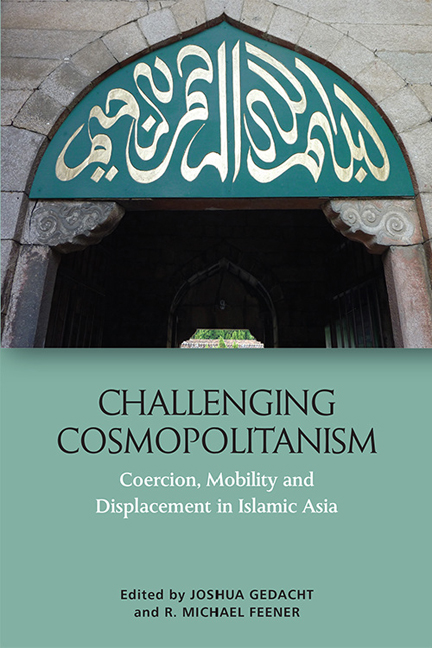Book contents
- Frontmatter
- Contents
- Preface
- 1 Hijra, Ḥajj and Muslim Mobilities: Considering Coercion and Asymmetrical Power Dynamics in Histories of Islamic Cosmopolitanism
- 2 Islamicate Cosmopolitanism from North Africa to Southeast Asia
- 3 Sufi Cosmopolitanism in the Seventeenth-century Indian Ocean: Sharīʿa, Lineage and Royal Power in Southeast Asia and the Maldives
- 4 The White Heron Called by the Muezzin: Shrines, Sufis and Warlords in Early Modern Java
- 5 Variations of ‘Islamic Military Cosmopolitanism’: The Survival Strategies of Hui Muslims during the Modern Period
- 6 Writing Cosmopolitan History in Nineteenth-century China: Li Huanyi’s Words and Deeds of Islamic Exemplars
- 7 The ‘Shaykh al-Islām of the Philippines’ and Coercive Cosmopolitanism in an Age of Global Empire
- 8 Bordering Malaya’s ‘Benighted Lands’: Frontiers of Race and Colonialism on the Malay Peninsula, 1887–1902
- 9 Afghanistan’s Cosmopolitan Trading Networks: A View From Yiwu, China
- Notes on the Contributors
- Index
1 - Hijra, Ḥajj and Muslim Mobilities: Considering Coercion and Asymmetrical Power Dynamics in Histories of Islamic Cosmopolitanism
Published online by Cambridge University Press: 01 May 2021
- Frontmatter
- Contents
- Preface
- 1 Hijra, Ḥajj and Muslim Mobilities: Considering Coercion and Asymmetrical Power Dynamics in Histories of Islamic Cosmopolitanism
- 2 Islamicate Cosmopolitanism from North Africa to Southeast Asia
- 3 Sufi Cosmopolitanism in the Seventeenth-century Indian Ocean: Sharīʿa, Lineage and Royal Power in Southeast Asia and the Maldives
- 4 The White Heron Called by the Muezzin: Shrines, Sufis and Warlords in Early Modern Java
- 5 Variations of ‘Islamic Military Cosmopolitanism’: The Survival Strategies of Hui Muslims during the Modern Period
- 6 Writing Cosmopolitan History in Nineteenth-century China: Li Huanyi’s Words and Deeds of Islamic Exemplars
- 7 The ‘Shaykh al-Islām of the Philippines’ and Coercive Cosmopolitanism in an Age of Global Empire
- 8 Bordering Malaya’s ‘Benighted Lands’: Frontiers of Race and Colonialism on the Malay Peninsula, 1887–1902
- 9 Afghanistan’s Cosmopolitan Trading Networks: A View From Yiwu, China
- Notes on the Contributors
- Index
Summary
In 750 CE, turmoil and violence engulfed the city of Damascus, then the seat of the Umayyad caliphate. The Arab rulers of the ‘first dynasty of Islam’ had been challenged by various groups of ‘piety-minded’ Muslims who asserted that the Umayyad elite had betrayed their responsibilities as successors to the leadership of the Prophet Muḥammad over the community that he had established a century earlier – choosing, as their critics argued, to privilege Arab clan lineage over pious rectitude as the standard of legitimacy. As a result, military forces under the control of the ascendant ʿAbbāsids brought together a coalition of disaffected segments from an increasingly diverse Islamic empire to overthrow the Umayyads. Political and religious authority would subsequently shift, with the ʿAbbāsid family claiming the mantle of caliphal authority and moving their capital out of Damascus to the newly constructed city of Baghdad.
Out of the destruction that befell the Umayyads in Syria, however, one member of the family, ʿAbd al-Raḥmān, managed to survive and flee west across North Africa before crossing the Straits of Gibraltar to the Iberian Peninsula, establishing a new Umayyad caliphate in al-Andalus. Modern scholars have celebrated the cultural achievements of al-Andalus as a ‘golden age of Islamic civilization’. María Rosa Menocal, for example, has described the ‘cosmopolitan’ Andalusian caliphate as one of unparalleled prosperity and openness, as a place where Muslims, Christians and Jews, along with Arabs, Berbers and Europeans, all commingled under the beneficent leadership of the reconstituted Umayyad caliphate. Literary Hebrew flourished anew with distinctive Arabic accents and prosody; Muslim scholars likes Ibn Rushd (d. 1198) studied side by side with legendary Jewish thinkers such as Maimonides (Ar. Mūsā b. Maymūn, d. 1204), cross-pollinating ideas, legal theories and theological precepts. This atmosphere of tolerance, in turn, contributed not only to commercial prosperity and an influx of mobile migrants, but also to an intellectual and artistic flourishing, with a proliferation of books, libraries and palaces like the ornate Alhambra in Granada, whose ruins survive to the present day. Indeed, the Córdoban caliphate emerged as the richest, most powerful kingdom on the European continent and an estimable rival to the ʿAbbāsid caliphate in Baghdad at the same time that Muslims also spread east across Asia to the borderlands of China.
- Type
- Chapter
- Information
- Challenging CosmopolitanismCoercion, Mobility and Displacement in Islamic Asia, pp. 1 - 29Publisher: Edinburgh University PressPrint publication year: 2018



